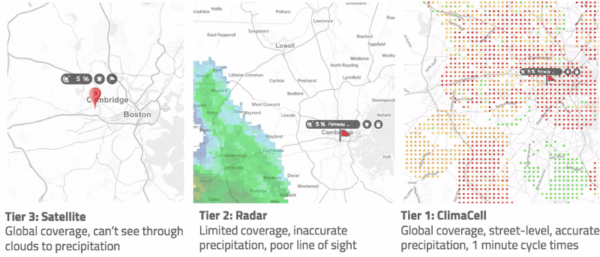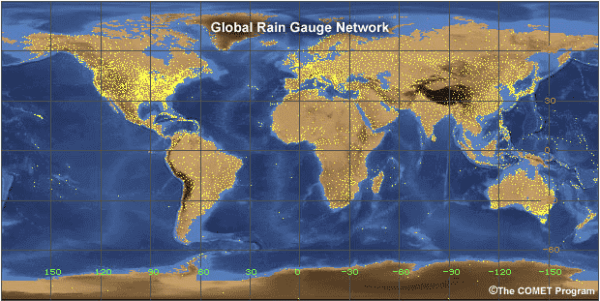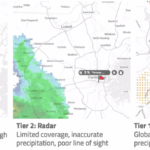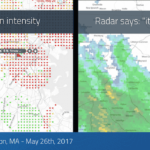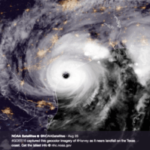Our climate is changing faster than ever before, bringing record-breaking storms, flooding, fires, and temperature swings. To track how intensifying climate volatility is impacting industries globally, Tomorrow.io recently released our 2024 AI Integrated Weather Business Report analyzing over 29,000 weather alerts from leading organizations across sectors. The findings showed clear signals about the urgent need for predictive weather AI systems, including:
- A 10x year-over-year increase in weather alerts
- 50% of weather disruption alerts now being classified as high severity
- Specific acute “disruption days” driving over 10% of alerts
We sat down with Bruce Simpson, Senior Advisor to McKinsey & co-founder of the firm’s ESG practice, to get his take on what these trends reveal about the state of climate risk and sustainable growth.
With over 20 years of experience advising leading corporations on environmental, social, and governance (ESG) best practices, Simpson is an expert in helping organizations worldwide improve their climate intelligence.
Here are our top conversation findings:
Frequent, Extreme Weather Events Are the New Norm
The dramatic increase in frequency and severity of extreme weather events, as identified in the report, underscores a significant shift in global climate patterns.
Simpson also emphasizes this change, stating, “The number of extreme weather events is increasing exponentially.” This trend not only validates the escalating impact of climate risk but also emphasizes the imperative for businesses to adapt to this changing landscape swiftly.
This revelation is a clear call for businesses to reevaluate their operational and continuity plans. Recognizing extreme weather as the new norm is the first step towards developing more resilient strategies that can withstand these increasingly high-impact weather challenges.
Sustainability Not Just an Ideology; A Focus On Materiality
Reflecting the report’s findings, the transition from ideologically driven to materially focused sustainability efforts marks a significant evolution in corporate strategy.
Simpson highlights this shift, stating, “It’s not just about an ideology, it’s about materiality. That’s important.” This adjustment reflects an emphasis on the tangible impact of climate change on businesses and the impact businesses have on climate change. It illustrates the critical need for sustainability initiatives to be focused on material impact and grounded in measurable business terms and language, including risk, cost, and revenue implications.
This paradigm shift ensures that businesses can address the urgent sustainability challenges of today while preparing for the uncertainties of tomorrow, making sustainability a cornerstone of strategic business planning.
Predictive Weather Intelligence is Critical for Enterprise Resilience
Our report highlights the undeniable necessity of predictive weather intelligence in enabling businesses to navigate the increasing volatility of global weather patterns effectively.
Simpson also accentuates this need, emphasizing the groundbreaking advantage offered by advanced technology: “What is revolutionary about what Tomorrow.io is doing is it enables companies to actually prepare for those events in advance.” This proactive approach shifts the paradigm from merely reacting to weather disruptions to strategically anticipating and mitigating their impact, days and weeks in advance.
Incorporating predictive weather intelligence into the core of business operations emerges as a critical strategy for future-proofing against climate change’s unpredictable nature.
Tomorrow.io’s cutting-edge probabilistic forecasting empowers organizations to turn climate uncertainties into actionable insights confidently.
Embedding Climate Resilience is a Non-Negotiable for Future-Proofing Businesses
As evidenced in the data, businesses must fundamentally reevaluate their approach to operational and strategic planning in light of escalating extreme weather events. Simpson offers a profound insight into the necessity of adopting climate resilience measures: “This is not an exception; it’s the norm. We need to get out ahead of the game and look at ways in which technology can help us anticipate extreme weather events and then manage the response to them before they actually happen.” Simpson’s statement sheds light on the essential shift from viewing climate resilience as an optional add-on to recognizing it as a critical component of business planning and operations.
The call to action for businesses to integrate climate resilience into their operational DNA has never been more urgent. By leveraging cutting-edge technology and predictive intelligence, companies can transition from a stance of vulnerability to one of preparedness and strength.
Sustainability As An Increasingly Important Competitive Advantage
The insights from our report reveal a compelling narrative: businesses that prioritize sustainability are not just contributing to a healthier planet but are also positioning themselves for stronger growth and resilience in the face of climate change. Simpson articulates the economic rationale behind this shift, noting, “Companies with very high performance on sustainability also have lower debt costs because they are seen to be lower risk. Products that are positioned as being good for the planet, like organic products, have twice the growth of products that don’t have that benefit.” This perspective emphasizes the direct link between sustainable practices and enhanced business outcomes, highlighting the importance of sustainability as a strategic advantage in today’s market.
The transition towards sustainability is no longer a choice but a necessity for businesses aiming to thrive in the climate-conscious era. This approach not only mitigates environmental impact but also leverages the growing consumer and investor demand for responsible business practices, driving growth, reducing risks, and fostering innovation.
Building Enduring Climate Readiness
The data makes the imperative clear – with extreme weather accelerating exponentially, climate resilience through predictive intelligence must become integrated directly into enterprise operations.
By leveraging Tomorrow.io’s industry-leading weather analytics, organizations globally now gain the power to circumvent intensifying impacts while seizing new opportunities.
Frequently Asked Questions (FAQ)
As businesses face increasing climate volatility, understanding how to integrate sustainability and climate resilience into core operations is more critical than ever.
To help clarify some of the key concepts discussed in our conversation and report, we’ve compiled a list of frequently asked questions (FAQ) about climate risk, ESG, and the role of predictive weather intelligence in ensuring business resilience.
1. What is ESG?
ESG stands for Environmental, Social, and Governance. These criteria evaluate a company’s operations in three critical areas:
- Environmental: How the business impacts the environment and manages energy consumption.
- Social: The company’s relationships with employees, suppliers, customers, and communities, focus on diversity, equity, and inclusion.
- Governance: Corporate policies and practices, ensuring compliance with laws and ethical behavior.
ESG is essential for businesses that balance profitability with sustainability and societal responsibility.
2. How does climate risk affect business operations?
Climate risk affects businesses in multiple ways, including operational disruptions, supply chain interruptions, and increased costs due to extreme weather events such as floods, storms, and fires. These risks demand a proactive approach to mitigate potential damages and ensure continuity. Companies incorporating climate resilience into their strategic planning can better prepare for and recover from such events.
3. Why is predictive weather intelligence important for sustainability?
Predictive weather intelligence allows businesses to anticipate and plan for extreme weather events. This advanced technology, such as Tomorrow.io’s Weather Intelligence Platform, shifts organizations from a reactive to a proactive stance, enabling them to mitigate the impacts of climate disruptions before they occur. Predictive insights are critical in minimizing financial losses and ensuring operational continuity.
4. What is materiality in the context of sustainability?
In sustainability, materiality refers to focusing on the aspects of a business that significantly impact both the company and the environment. Rather than approaching sustainability as an ideology, materiality focuses on measurable outcomes like reducing carbon emissions, improving resource efficiency, and managing climate risks. This helps align sustainability with business goals such as profitability and growth.
5. How can businesses integrate climate resilience into their operations?
Businesses can integrate climate resilience by adopting advanced technologies like Tomorrow.io’s predictive weather intelligence, which helps anticipate extreme weather and mitigate its effects. Incorporating climate resilience involves updating operational strategies, investing in sustainable infrastructure, and developing contingency plans to reduce vulnerability to weather-related disruptions.
6. What role does sustainability play as a competitive advantage?
Sustainability is increasingly seen as a strategic advantage. Companies that prioritize sustainability often enjoy lower operational costs, increased consumer loyalty, and improved access to capital. Additionally, businesses with strong sustainability performance are perceived as lower risk, which can lead to lower debt costs and greater long-term profitability .
7. What is the significance of the Task Force on Climate-related Financial Disclosures (TCFD)?
The Task Force on Climate-related Financial Disclosures (TCFD) provides guidelines for companies to disclose the financial risks associated with climate change. These disclosures are essential for investors, stakeholders, and regulatory bodies to understand how climate risks impact a company’s financial health and operations. TCFD guidelines have become a global benchmark for climate risk reporting.

